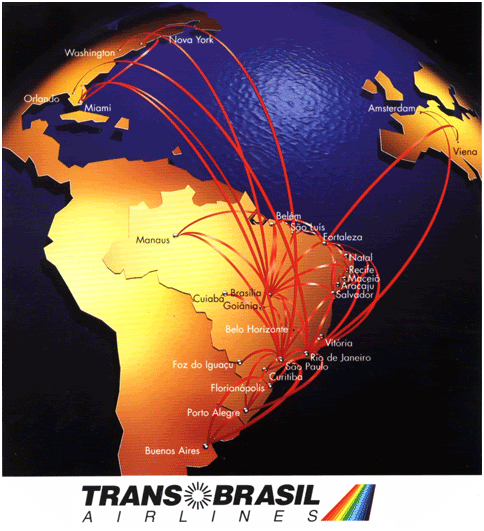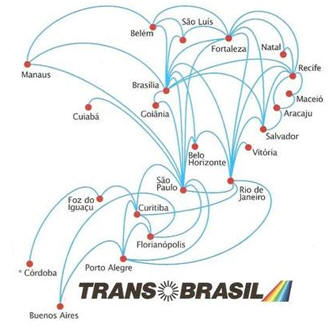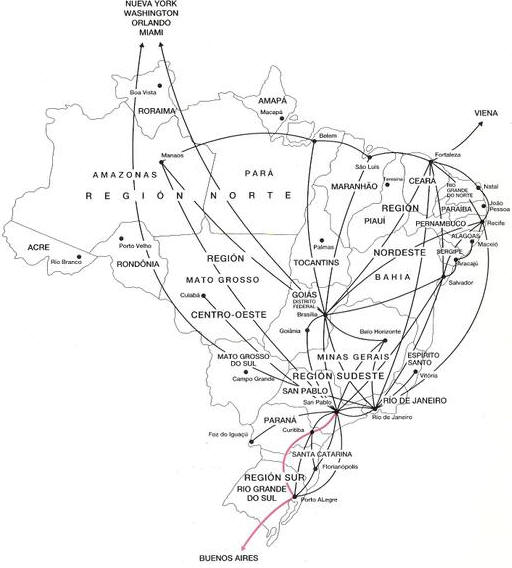Sadia Transportes Aéreos was created on January 5, 1955 with one
DC-3 from Panair do Brasil to transport meat
between Concordia, Joaçaba and Sao Paulo. On March 16, 1956 the first
scheduled flight took off from Sao Paulo to Joaçaba, Videira and
Florianopolis. The fleet consisted of one C-46 and two DC-3.
In 1957 Real bought 50% of the company, which won one
C-46 and three DC-3.
In August 1961 Real-Aerovias-Nacional was purchased
by Varig and the share on Sadia was transferred to
Linneu Gomes.
In 1962 Sadia bought Transportes Aéreos Salvador and the Sadia’s fleet
became composed of fifteen DC-3 and five C-46 that served fifty-three
cities.
In 1963 comes its first turboprop aircraft. Handley Page Dart Herald.
In September 1970 the company received its first jet BAC 1-11-500, dubbed "Jatão"
(big jet).
In June 1972 Sadia was renamed to Transbrasil, a name that symbolizes the
union of the country through company's flights. Transbrasil called attention
with vibrant colors in its aircrafts. During 70s the airline began a big
expansion becoming the third largest airline in Brazil. In 1974 received its
first Boeing 727-100. Transbrasil became the Boeing 727’s largest operator
in Latin America with twenty-two units.
On June 18, 1983 Transbrasil was the first airline in Southern Hemisphere to
receive the Boeing 767-200 and started charter flights to Orlando.
In 1986 began the modernization of the fleet with the Boeing 737-300.
In 1988 the Boeing 707-300 fleet was reduced to four and only used for cargo
transport and the last Boeing 727-100 was retired. In this year Transbrasil
also received three Boeing 737-400. Transbrasil would be the first airline
in Brazil and one of the first in the world to operate the Boeing 757, but
the aircraft never arrived due Brazil’s financial situation at that time.
Moreover Transbrasil and other Brazilians airlines suffered a lot with many
plans to decrease Brazil’s inflation. With the “price freeze”, even if a
100% of load factor, the airline would have a loss. In September 1988 the
company sued the government and then it suffered an intervention. The
president and other executives were removed, but in 1990 the intervention
was over and they returned.
In 1989 Transbrasil was authorized to fly to Orlando, breaking
Varig’s monopoly on international market. For
fifteen years Varig was the only Brazilian airline
that had international flights. Transbrasil’s first international flight
occurred in June,1990 on the route Sao Paulo – Rio de Janeiro – Miami –
Orlando, with the Boeing 767-200.
In 1991 inaugurated the route Rio de Janeiro - Sao Paulo - Brasília -
Washington. In the same year the company ordered six Boeing 767-300ER with
options for five Boeing 777-200. In June received three Boeing 767-300ER. At
that time Transbrasil had the youngest fleet in Latin America with 6.8 of
average years.
In June 1992 started flights to New York, with a stop in Miami or in
Washington.
In 1993 Transbrasil received three 767-200ER.
In 1994 the airline began to flight to Buenos Aires with the Boeing 737-300
and 737-400 and created its regional subsidiary
InterBrasil. In November started it
first flight to Europe, to Vienna with the Boeing 767.
In 1995 canceled the Boeing 777 order and in June began to fly to Amsterdam.
In 1997 the company started flights to Lisbon.
In 1998 canceled the route to New York and Washington. In October launched
its new logo. In the same year the company won a lawsuit against the
government, but wasn’t enough to remedy the company's debts.
In 1999 Transbrasil suffered with the Real devaluation reduced its
international destinations to Buenos Aires, Miami and Orlando only. The
airline also launched its frequent flyer program “Transpass”.
In May 2000 TrasnBrasil signed an agreement with Tam to use Tam’s aircrafts
in Rio de Janeiro - Sao Paulo route and thus was initiated a rumor that the
two airlines would merger, but the agreement was canceled at the end of this
year.
In 2001 Transbrasil canceled all international flights except to Buenos
Aires and the fleet was reduced to six Boeing 737-300, three Boeing 767-200
and one Boeing 767-300. Shortly all Boeing 767 were grounded, remaining only
six 737.
On December 3, 2001 the company had no money to pay for fuel and ceased
operations, leaving one hundred thousand passengers without flights.
|
Logos:
|
Founded: 1955
Ceased: 2001
Hubs: Congonhas,
Guarulhos,
Juscelino Kubitschek,
Galeão
Headquarters:
Brasília
Code:
TBA / TR
![]()
AeroBrasil was cargo airline subsidiary of Transbrasil. It operated
Transbrasil's Boeing 707 in 90's.
Founded:
1980
Ceased: 1997
Headquarters:
Sao Paulo
Current Fleet:
Boeing 707-300
![]()

InterBrasil Star (Sistema de Transporte Aéreo Regional) was founded in
1994 as the regional subsidiary of TrasnBrasil. Interbrasil started operations in July 1995 with three
EMB-120,
connecting the interior of Sao Paulo to the south of Brazil. The airline
would operate ERJ-145 and Boeing 737-300, but it never happened.
In 1996 Interbrasil received its fourth
EMB-120.
In 1998 reached the sixth
EMB-120 and launched its new visual
identity.
In 1999 operated an ATR-42-300 from Total between Sao Paulo, Belo
Horizonte and Rio de Janeiro.
In December 2001 Interbrasil ceased operations as well TrasnBrasil.
Founded:
1994
Ceased: 2001
Headquarters:
Sao Paulo
Current Fleet:
Embraer EMB-120
Destinations:
15

Presidente was born in 1987 as air-taxi. In 1996 began regular flights
as regional airline with three EMB-110.
In 2001 the company suspended all operations permanently.
Founded:
1996
Ceased: 2001
Headquarters:
Cuiabá
Current Fleet:
EMB-110
> Fleet:
| E |
|
||||||||||||||||||||||||||||||||||||||||||||||||||||||||||||||||||||||||||||||||||||||||||
| E |
|
|||||||||||||||||||||||||||||||||||||||||||||||||||||||||||||||||||||||||||||
| E |
|
||||||||||||||||||||||||||||||||||||||||||||||||||||||||||||||||||||||||||||||||||||||||||||||||||||||||||||||||||||||||
| E |
|
||||||||||||||||||||||||||||||||||||||||||||||||||||||||||||||||||||||||||||||||||||||||||||||||||||||||||||||||||||||||||||||||||||||||||||||||||||||||||||
> Route Map:


1996

1994

1973
Updated 2012



































